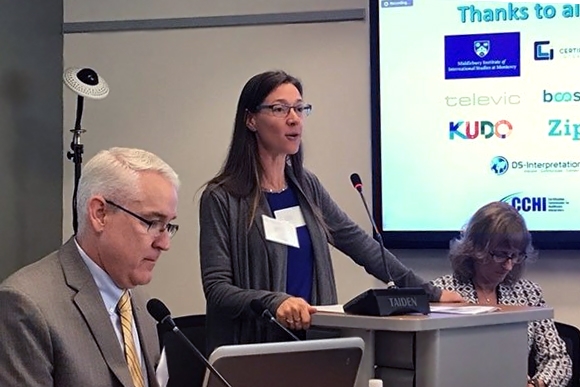Institute Alumni, Faculty Convene InterpretAmerica Summit in Washington

Professional interpreters from across the United States gathered at Middlebury’s Washington, D.C. offices earlier this week for the InterpretAmerica Summit, hosted by a pair of Middlebury Institute alumni and attended by close to a dozen alumni, faculty, and students.
The mission of InterpretAmerica, co-founded in 2010 by Institute alumni Barry Slaughter Olsen MACI ’99 (also a faculty member) and Katharine Allen MATI ’08, is to “provide a national forum for the entire interpreting profession and to ultimately raise its profile, both inside and outside the industry.”
“The Institute’s close collaboration with InterpretAmerica also benefits our translation and interpretation students,” noted Professor Olsen, “giving them the chance to get hands-on experience with emerging new platforms they will likely work with once they graduate.” Olsen recently piloted a new Remote Interpreting Technologies and Practice course offering students access to the latest remote interpretation tools and platforms.
InterpretAmerica’s 6th biennial Summit was cosponsored by the Institute and hosted at Middlebury‘s Washington D.C. offices. The focus of the 2017 summit was on the “disruptive waves” represented by the migration toward mobile and online for both the profession in general and specifically the setting in which interpreting happens. Organizers said this shift toward mobile/online conversation in multiple languages represents nothing less than “humans changing how they communicate with each other” and described the pace of change as “breathtaking,” noting that it is affecting everything from how international conferences are conducted to how doctors interact with patients and how defendants attend court hearings.
The Institute’s close collaboration with InterpretAmerica also benefits our translation and interpretation students, giving them the chance to get hands-on experience with emerging new platforms they will likely work with once they graduate.
As organizers noted in the preamble to this year’s summit:
- Demand for qualified, professional interpreters is skyrocketing, but the training pipeline infrastructure is woefully underdeveloped.
- Buyers of interpreting services increasingly insist on remote interpreting solutions and often institute new platforms with little regard for their impact on working interpreters or the end users of their services.
- Technology companies are creating innovative and often-promising platforms for interpreters to connect to employers but have a hard time reaching their target audience.
- Language service companies are caught in between buyers, interpreters and end users, struggling to find the right talent for the right job with the right technology at the right time.
This year’s Summit had the ambitious goal of moving the interpreting community toward “the creation and implementation of best practices for remote interpreting across all interpreting specializations and stakeholder groups.”
Allen says that the big message of this year’s Summit is that “Remote interpreting has arrived and fortunately, leadership in the field is eager to step up and help guide its rollout across the profession.” She notes that there is a steep initial learning curve for newcomers to remote interpreting, and “new, additional skill sets they have to master to be able to facilitate the communication needs of end users.” Ultimately, Allen believes that InterpretAmerica was successful in convening what she termed “a critical conversation” around the future of remote interpreting.
For More Information
Jason Warburg
jwarburg@middlebury.edu
831-647-3516
Eva Gudbergsdottir
evag@middlebury.edu
831-647-6606
